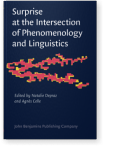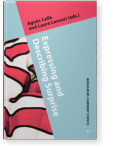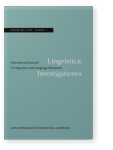Anne Jugnet
List of John Benjamins publications for which Anne Jugnet plays a role.
2019 Chapter 7. Interrogatives in surprise contexts in English Surprise at the Intersection of Phenomenology and Linguistics, Depraz, Natalie and Agnès Celle (eds.), pp. 117–138 | Chapter
Verbal reactions to surprising situations or surprising information often include interrogative structures rather than exclamatives, contrary to what is assumed in traditional grammars. In such contexts, interrogatives combine requests for information and the expression of surprise (possibly… read more
2019 Chapter 8. Looking at ‘unexpectedness’: A corpus-based cognitive analysis of surprise & wonder Surprise at the Intersection of Phenomenology and Linguistics, Depraz, Natalie and Agnès Celle (eds.), pp. 139–170 | Chapter
The nouns surprise and wonder have often been included in the subclass of potentially polysemous psych nouns, which can denote a psychological state and have a derived source reading. Our corpus-based analysis leads us to conclude that these nouns tend to refer to sources of surprise, and as such… read more
2017 Expressing and describing surprise Expressing and Describing Surprise, Celle, Agnès and Laure Lansari (eds.), pp. 215–244 | Article
This paper re-examines the well-established distinction between expression and description of emotion as regards surprise. First, the authors show that the expression of surprise does not involve the use of surprise lexemes, but rather mirative utterances and specific syntactic constructions (while… read more
2013 De l’existence des prédicats d’achèvements Lingvisticæ Investigationes 36:1, pp. 56–89 | Article
The very existence of achievements (defined as instantaneous eventualities) is often questioned in the literature, which is why our first objective is to maintain that this aspectual class does exist, in the verbal as in the nominal domains. Thanks to a series of tests, we distinguish three… read more


